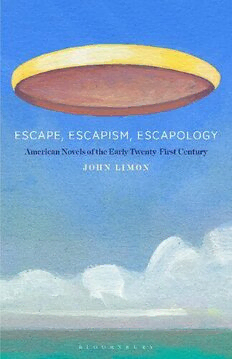
Escape, Escapism, Escapology: American Novels of the Early Twenty-First CenturyAmerican Novels of the Early Twenty-First Century PDF
249 Pages·2022·3.809 MB·English
Most books are stored in the elastic cloud where traffic is expensive. For this reason, we have a limit on daily download.
Preview Escape, Escapism, Escapology: American Novels of the Early Twenty-First CenturyAmerican Novels of the Early Twenty-First Century
Description:
Escape, Escapism, Escapology: American Novels of the Early Twenty-First Century identifies and explores what is emerging as perhaps the theme of 21st-century American fiction: the desire to escape - from the present, from history, from the existential - at a time of inescapable globalization.The driving question is how to find an alternative to the world within the world, and at a time when utopian and messianic ideals have lost their power to compel belief. John Limon traces the American answer to that question in the writings of some of the most important authors of the last two decades—Chabon, Díaz, Foer, Eggers, Donoghue, Groff, Ward, Saunders, and Whitehead, among others—and finds that it always involves the contemporary utopian freedom or messianic salvation of childhood. He also places this American view of escape in relation to the oeuvres of world novelists David Grossman and Arundhati Roy, for whom experience always precedes the innocence that American authors strive to isolate, defend, usurp, and mobilize for their own projects.Radical escape, in the form of utopianism and messianism, as well as historical escape, most often from slavery or Nazism, haunts and provides the narrative impetus for the novels Limon examines, but always delivers characters to the inescapable globalism of the present and cannot save them from what they take to be the closing of the world frontier.
See more
The list of books you might like
Most books are stored in the elastic cloud where traffic is expensive. For this reason, we have a limit on daily download.
